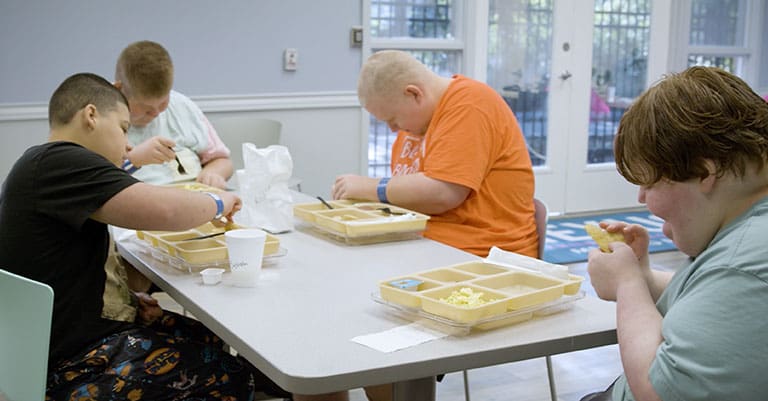For the patients at Nexus Children’s Hospital, communal mealtime is an important part of the day.
Besides providing them with structure and time to socialize with other patients, it also affords them an opportunity to progress through their individualized therapy plans as they work towards returning to lives of productivity and meaning at home and school.
Children diagnosed with Prader-Willi Syndrome (PWS), a rare genetic disorder that causes insatiable appetite and weight gain due to overeating, benefit greatly from communal meals. “For our PWS kids, we use communal meals to monitor them when they’re around food,” explained Jean Park, MS, MBA, RD, LD, Director of Nutritional Services at Nexus Children’s Hospital. “It helps our staff ensure that they aren’t hiding or stealing food.” Since each child receives the same items on their food tray (with varying portion sizes and adjustments for diet restrictions), communal meals also help in easing the anxiety that may accompany mealtime for some children. “It seems to work pretty well and helps the kids feel relaxed,” Jean said.
Communal meals don’t just benefit children with PWS – they’ve also proven useful for patients who struggle with behavioral challenges or traumatic brain injuries. At Nexus Children’s Hospital, they’re used to bring children together and help them with their individual therapy and neurorehabilitation goals. “The patients at Nexus Children’s Hospital on our behavioral units aren’t allowed to have food in their room, so we use communal meals to monitor their behaviors as a group,” said Jean. Besides ensuring that patients aren’t hiding food to eat later or share with other patients, the staff also uses this time to model appropriate behavior for mealtime. “We make sure they’re behaving appropriately as they eat – not over-stuffing or throwing their food and practicing their table manners,” Jean said.
For children who are working towards specific therapy goals, communal meals are a time to practice. “There are also some therapy goals they can work on during mealtime, like chewing food appropriately or swallowing strategies,” Jean explained. “There may be some kids that struggle with impulse control or have lower-level cognitive function, and we work with them on using utensils and practicing pro-social behavior during meals.”
Meals also provide a venue for socialization and interaction between the patients, as well as implementing skills they can use when they return home and go back to school. “At the end of every meal, the staff has a system for helping the kids clean up and modeling those appropriate behaviors when it comes to being responsible for their trash,” Jean added. “It’s something they can keep practicing once they are discharged.”
Research shows that eating with family members promotes nutritional health in children while reducing food insecurity, and the staff at Nexus Children’s Hospital encourages the continuation of communal meals after patients are discharged. “When children return home, families should try to eat communally when possible,” said Jean. “It’s recommended that at least one family member eats with the child during meals to model the behaviors they were taught in our program.”
Visit our overview page for our location in The Woodlands to learn more about Nexus Children’s Hospital, including the Jump Start Program designed to treat patients with PWS.

